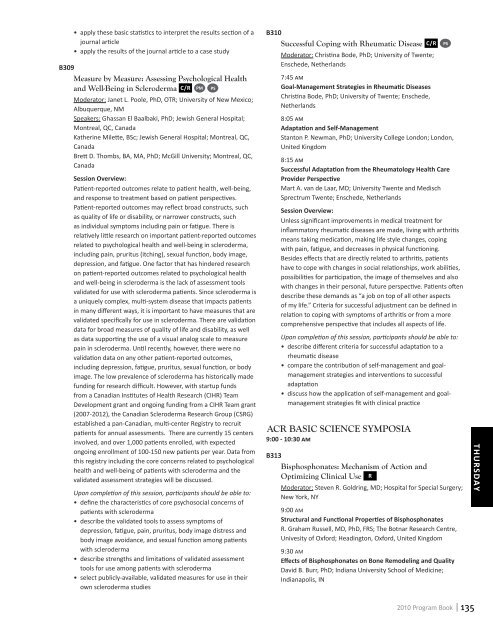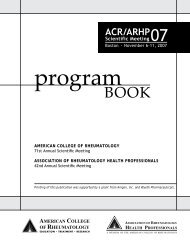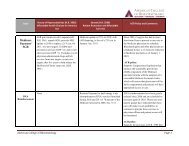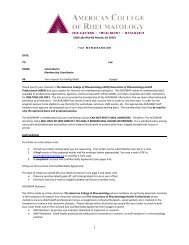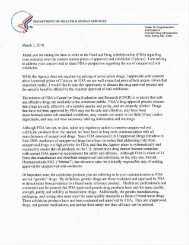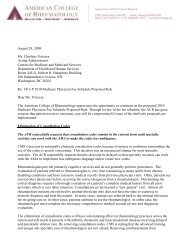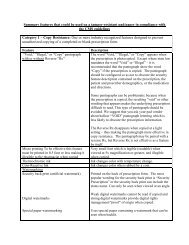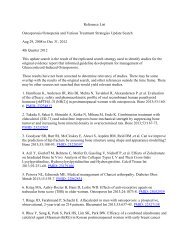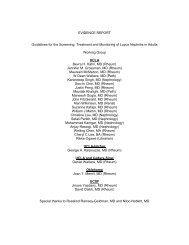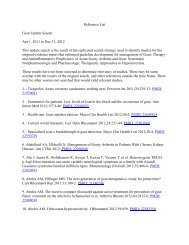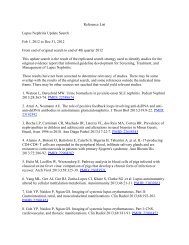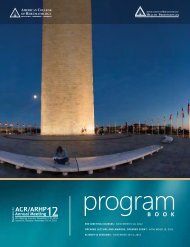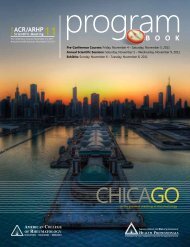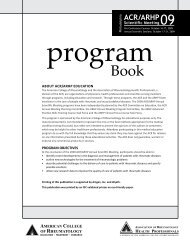B O O K - American College of Rheumatology
B O O K - American College of Rheumatology
B O O K - American College of Rheumatology
Create successful ePaper yourself
Turn your PDF publications into a flip-book with our unique Google optimized e-Paper software.
• apply these basic statistics to interpret the results section <strong>of</strong> a<br />
journal article<br />
• apply the results <strong>of</strong> the journal article to a case study<br />
B309<br />
Measure by Measure: Assessing Psychological Health<br />
and Well-Being in Scleroderma c/r PM PS<br />
Moderator: Janet L. Poole, PhD, OTR; University <strong>of</strong> New Mexico;<br />
Albuquerque, NM<br />
Speakers: Ghassan El Baalbaki, PhD; Jewish General Hospital;<br />
Montreal, QC, Canada<br />
Katherine Milette, BSc; Jewish General Hospital; Montreal, QC,<br />
Canada<br />
Brett D. Thombs, BA, MA, PhD; McGill University; Montreal, QC,<br />
Canada<br />
Session Overview:<br />
Patient-reported outcomes relate to patient health, well-being,<br />
and response to treatment based on patient perspectives.<br />
Patient-reported outcomes may reflect broad constructs, such<br />
as quality <strong>of</strong> life or disability, or narrower constructs, such<br />
as individual symptoms including pain or fatigue. There is<br />
relatively little research on important patient-reported outcomes<br />
related to psychological health and well-being in scleroderma,<br />
including pain, pruritus (itching), sexual function, body image,<br />
depression, and fatigue. One factor that has hindered research<br />
on patient-reported outcomes related to psychological health<br />
and well-being in scleroderma is the lack <strong>of</strong> assessment tools<br />
validated for use with scleroderma patients. Since scleroderma is<br />
a uniquely complex, multi-system disease that impacts patients<br />
in many different ways, it is important to have measures that are<br />
validated specifically for use in scleroderma. There are validation<br />
data for broad measures <strong>of</strong> quality <strong>of</strong> life and disability, as well<br />
as data supporting the use <strong>of</strong> a visual analog scale to measure<br />
pain in scleroderma. Until recently, however, there were no<br />
validation data on any other patient-reported outcomes,<br />
including depression, fatigue, pruritus, sexual function, or body<br />
image. The low prevalence <strong>of</strong> scleroderma has historically made<br />
funding for research difficult. However, with startup funds<br />
from a Canadian Institutes <strong>of</strong> Health Research (CIHR) Team<br />
Development grant and ongoing funding from a CIHR Team grant<br />
(2007-2012), the Canadian Scleroderma Research Group (CSRG)<br />
established a pan-Canadian, multi-center Registry to recruit<br />
patients for annual assessments. There are currently 15 centers<br />
involved, and over 1,000 patients enrolled, with expected<br />
ongoing enrollment <strong>of</strong> 100-150 new patients per year. Data from<br />
this registry including the core concerns related to psychological<br />
health and well-being <strong>of</strong> patients with scleroderma and the<br />
validated assessment strategies will be discussed.<br />
Upon completion <strong>of</strong> this session, participants should be able to:<br />
• define the characteristics <strong>of</strong> core psychosocial concerns <strong>of</strong><br />
patients with scleroderma<br />
• describe the validated tools to assess symptoms <strong>of</strong><br />
depression, fatigue, pain, pruritus, body image distress and<br />
body image avoidance, and sexual function among patients<br />
with scleroderma<br />
• describe strengths and limitations <strong>of</strong> validated assessment<br />
tools for use among patients with scleroderma<br />
• select publicly-available, validated measures for use in their<br />
own scleroderma studies<br />
B310<br />
Successful Coping with Rheumatic Disease c/r PS<br />
Moderator: Christina Bode, PhD; University <strong>of</strong> Twente;<br />
Enschede, Netherlands<br />
7:45 am<br />
Goal-Management Strategies in Rheumatic Diseases<br />
Christina Bode, PhD; University <strong>of</strong> Twente; Enschede,<br />
Netherlands<br />
8:05 am<br />
Adaptation and Self-Management<br />
Stanton P. Newman, PhD; University <strong>College</strong> London; London,<br />
United Kingdom<br />
8:15 am<br />
Successful Adaptation from the <strong>Rheumatology</strong> Health Care<br />
Provider Perspective<br />
Mart A. van de Laar, MD; University Twente and Medisch<br />
Sprectrum Twente; Enschede, Netherlands<br />
Session Overview:<br />
Unless significant improvements in medical treatment for<br />
inflammatory rheumatic diseases are made, living with arthritis<br />
means taking medication, making life style changes, coping<br />
with pain, fatigue, and decreases in physical functioning.<br />
Besides effects that are directly related to arthritis, patients<br />
have to cope with changes in social relationships, work abilities,<br />
possibilities for participation, the image <strong>of</strong> themselves and also<br />
with changes in their personal, future perspective. Patients <strong>of</strong>ten<br />
describe these demands as “a job on top <strong>of</strong> all other aspects<br />
<strong>of</strong> my life.” Criteria for successful adjustment can be defined in<br />
relation to coping with symptoms <strong>of</strong> arthritis or from a more<br />
comprehensive perspective that includes all aspects <strong>of</strong> life.<br />
Upon completion <strong>of</strong> this session, participants should be able to:<br />
• describe different criteria for successful adaptation to a<br />
rheumatic disease<br />
• compare the contribution <strong>of</strong> self-management and goalmanagement<br />
strategies and interventions to successful<br />
adaptation<br />
• discuss how the application <strong>of</strong> self-management and goalmanagement<br />
strategies fit with clinical practice<br />
ACR Basic Science Symposia<br />
9:00 - 10:30 am<br />
B313<br />
Bisphosphonates: Mechanism <strong>of</strong> Action and<br />
Optimizing Clinical Use R<br />
Moderator: Steven R. Goldring, MD; Hospital for Special Surgery;<br />
New York, NY<br />
9:00 AM<br />
Structural and Functional Properties <strong>of</strong> Bisphosphonates<br />
R. Graham Russell, MD, PhD, FRS; The Botnar Research Centre,<br />
Univesity <strong>of</strong> Oxford; Headington, Oxford, United Kingdom<br />
9:30 AM<br />
Effects <strong>of</strong> Bisphosphonates on Bone Remodeling and Quality<br />
David B. Burr, PhD; Indiana University School <strong>of</strong> Medicine;<br />
Indianapolis, IN<br />
thursday<br />
2010 Program Book 135


